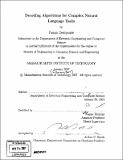| dc.contributor.advisor | Regina Barzilay. | en_US |
| dc.contributor.author | Deshpande, Pawan | en_US |
| dc.contributor.other | Massachusetts Institute of Technology. Dept. of Electrical Engineering and Computer Science. | en_US |
| dc.date.accessioned | 2008-05-19T16:05:01Z | |
| dc.date.available | 2008-05-19T16:05:01Z | |
| dc.date.copyright | 2007 | en_US |
| dc.date.issued | 2007 | en_US |
| dc.identifier.uri | http://hdl.handle.net/1721.1/41647 | |
| dc.description | Thesis (M. Eng.)--Massachusetts Institute of Technology, Dept. of Electrical Engineering and Computer Science, 2007. | en_US |
| dc.description | Includes bibliographical references (p. 79-85). | en_US |
| dc.description.abstract | This thesis focuses on developing decoding techniques for complex Natural Language Processing (NLP) tasks. The goal of decoding is to find an optimal or near optimal solution given a model that defines the goodness of a candidate. The task is challenging because in a typical problem the search space is large, and the dependencies between elements of the solution are complex. The goal of this work is two-fold. First, we are interested in developing decoding techniques with strong theoretical guarantees. We develop a decoding model based on the Integer Linear Programming paradigm which is guaranteed to compute the optimal solution and is capable of accounting for a wide range of global constraints. As an alternative, we also present a novel randomized algorithm which can guarantee an arbitrarily high probability of finding the optimal solution. We apply these methods to the task of constructing temporal graphs and to the task of title generation. Second, we are interested in carefully investigating the relations between learning and decoding. We build on the Perceptron framework to integrate the learning and decoding procedures into a single unified process. We use the resulting model to automatically generate tables-of-contents, structures with deep hierarchies and rich contextual dependencies. In all three natural language tasks, our experimental results demonstrate that theoretically grounded and stronger decoding strategies perform better than existing methods. As a final contribution, we have made the source code for these algorithms publicly available for the NLP research community. | en_US |
| dc.description.statementofresponsibility | by Pawan Deshpande. | en_US |
| dc.format.extent | 85 p. | en_US |
| dc.language.iso | eng | en_US |
| dc.publisher | Massachusetts Institute of Technology | en_US |
| dc.rights | M.I.T. theses are protected by
copyright. They may be viewed from this source for any purpose, but
reproduction or distribution in any format is prohibited without written
permission. See provided URL for inquiries about permission. | en_US |
| dc.rights.uri | http://dspace.mit.edu/handle/1721.1/7582 | en_US |
| dc.subject | Electrical Engineering and Computer Science. | en_US |
| dc.title | Decoding algorithms for complex natural language tasks | en_US |
| dc.type | Thesis | en_US |
| dc.description.degree | M.Eng. | en_US |
| dc.contributor.department | Massachusetts Institute of Technology. Department of Electrical Engineering and Computer Science | |
| dc.identifier.oclc | 219709911 | en_US |
